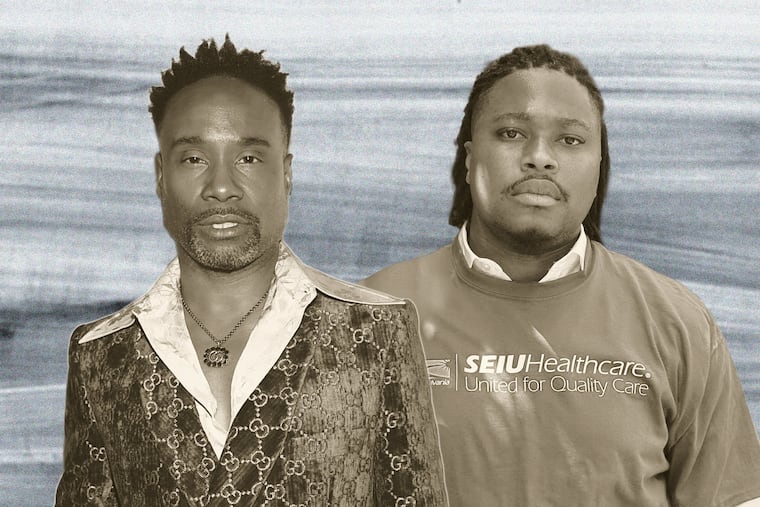Billy Porter and Malcolm Kenyatta: New Pa. law criminalizes HIV. Get rid of it.
It is disappointing to see our home state codify unscientific and harmful stigmas into law. It is disheartening as Black gay men to have to continue to fight myths that put us in harm's way.

It’s been more than four decades since HIV/AIDS took hold on our shores, and so much has changed. HIV is now a manageable, chronic condition with treatment so advanced that people living with HIV can live long, healthy lives without passing on the virus.
However, when it comes to HIV, the science has far outpaced the law.
Over 30 states still have outdated laws reinforcing old stigmas and myths about HIV transmission, treatment, and prevention. And these aren’t just laws left over from the 1980s and 1990s. Recent legislation, such as Act 99 in Pennsylvania, which took effect at the beginning of this year, undermines the decades of progress we’ve made in HIV prevention.
The new law creates two felony offenses that apply when a person intentionally causes a law enforcement officer to come into contact with bodily fluids. And it additionally includes discriminatory provisions that create harsher penalties for those living with a “communicable disease” such as HIV, which is specified in the act.
The act makes it a felony for people with HIV and other communicable diseases to toss, spit, or expel bodily fluids. But none of these acts are viable routes of HIV transmission.
Act 99 is regressive and harmful. While it does nothing to prevent the spread of HIV, it will discourage testing and treatment because it’s only charged as a felony if you know you have HIV and will increase HIV stigma by making people with HIV feel like criminals. While no individual, including law enforcement, should have to endure being spat on (or worse), legislators must understand the critical nuance and impacts of this law — and work in a bipartisan way to undo its unintended consequences.
We know this new law will disproportionately impact our Black, brown, LGBTQ, and working-class communities, but overall, this approach is wrong and dangerous for everyone. Using criminal law to address public health concerns is stigmatizing and discriminatory, by singling out people with HIV and other communicable diseases. And in this instance, it does not even align with modern science; this law does nothing to protect law enforcement.
It is disappointing to see leaders from our home state codify unscientific and harmful stigmas into law. It is disheartening as Black gay men to have to continue to fight myths that put us and our communities in harm’s way. We understand how important it is to fight stigma by speaking out — by telling our own stories or bringing them to life on-screen, by advocating against these discriminatory laws at the state House and across Pennsylvania.
No matter the platform, our message is clear: HIV is not a crime.
“Our message is clear: HIV is not a crime.”
Furthermore, HIV treatment today looks nothing like it did before. An increasing body of research is supporting the concept of “Undetectable = Untransmittable,” meaning that people who take their HIV medicine as prescribed can decrease the amount of virus in their blood to an undetectable level, at which point they cannot transmit the virus to others. Yet another reason why Act 99 makes no sense.
What’s more, Act 99 and other HIV criminalization laws don’t work; a 2017 CDC study found no correlation between HIV diagnosis rates and the effectiveness of criminal exposure laws. Instead, these laws cause harm. A report by the Williams Institute in Louisiana found that Black men account for 91% of arrests related to HIV in Louisiana, despite representing only 44% of the HIV population in the state.
» READ MORE: Roxborough alum Malcolm Kenyatta: ‘We are failing our kids’
The situation is likely no different in Pennsylvania, which according to the Department of Health, is home to approximately 36,000 people living with HIV.
In his proclamation on World AIDS Day in 2022, President Joe Biden called on all states to repeal their HIV criminalization laws, arguing they have “no basis in science.” We are urging Gov. Josh Shapiro and Pennsylvania’s leaders to stand up for all Pennsylvanians living with HIV and support upcoming legislation from State Rep. Kenyatta that will reverse the discriminatory aspects of Act 99.
Pennsylvania can act as a model for the other states that continue to enforce these antiquated laws. Criminal laws and enhanced penalties are not the answer to the HIV epidemic. We must continue to repeal or modernize all HIV laws and invest in proper and dignified care and services for people living with HIV. Please write and call your legislator and ask them to send Gov. Shapiro legislation to fix Act 99 and end HIV stigma in the commonwealth.
Born in Pittsburgh, Billy Porter is an actor, singer, writer and director whose work has been honored with the Emmy, Tony, and Grammy awards. Malcolm Kenyatta, a Philadelphia native, represents District 181 in the state House.